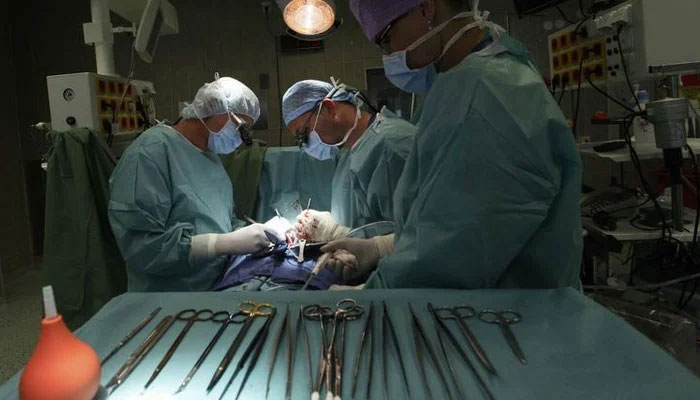Organ donors
Number of daily fatalities due to lack of organ donation reaches up to 20 in US
Among the most unnecessary causes of death across the world is that due to organ failure. Many of these deaths could be avoided if people were simply more willing to donate organs. According to reports, the scarcity of organ donations, often driven by social misconceptions, is leading to an estimated 10 to 15 fatalities each day in Pakistan. And this is not a problem limited to poorer countries in the Global South. The number of daily fatalities due to a lack of organ donation reaches up to 20 in the US. The global gap between organ donation and transplant demand is so wide that researchers and surgeons are now seriously turning to genetically engineered animal organs to fill the void. However, experts say that both ethical and religious concerns remain global barriers to the adoption of animal-to-human organ transfers, making more human organ donations the more reliable path to dealing with the global spike in organ failure and chronic disease. The growing availability of cheap and easily available junk food and increasingly unhealthy lifestyles is only compounding the problem, increasing the need to boost worldwide organ donations. Just a single organ donation can save up to seven lives, according to medical experts.
The hesitancy and misconceptions surrounding organ donations are particularly frustrating for Pakistan, given that several Muslim countries already permit organ donations from brain-dead patients. This practice is now also endorsed by leading scholars in Pakistan as well, under certain conditions. While there are concerns surrounding the illegal organ trade, the exploitation of the poor for organs and the lack of transparency surrounding the organ trade, discouraging official and properly regulated organ donations has not helped solve any of these problems. The clearest path forward is a transparent and well-regulated organ trade where both donors and recipients are protected. Such a framework should also aim to dispel misconceptions and assuage any religious concerns about organ donations and transplants.
Another problem surrounding organ transplants is the threat of post-transplant infections, a far bigger problem than organ rejection. In developed countries, these complications are now increasingly controlled with advanced drugs and medical technology. However, the availability of such drugs in Pakistan remains uncertain and must be addressed urgently. It would be rather pointless to encourage organ donations in an environment where most are afraid to undergo transplants for fear of infections that local medical facilities and resources cannot deal with. Hence, while the gap between organ donors and demand for organs might not be as wide in Pakistan as it is in countries like the US, the country still seems to remain under-equipped from both a technical and social standpoint to boost organ donation. Government messaging encouraging organ donation is out there, but more is likely needed. And so is a greater emphasis on countering misconceptions.
-
 Prince William, Kate Middleton Camp Reacts To Meghan's Friend Remarks On Harry 'secret Olive Branch'
Prince William, Kate Middleton Camp Reacts To Meghan's Friend Remarks On Harry 'secret Olive Branch' -
 Daniel Radcliffe Opens Up About 'The Wizard Of Oz' Offer
Daniel Radcliffe Opens Up About 'The Wizard Of Oz' Offer -
 Channing Tatum Reacts To UK's Action Against Andrew Mountbatten-Windsor
Channing Tatum Reacts To UK's Action Against Andrew Mountbatten-Windsor -
 Brooke Candy Announces Divorce From Kyle England After Seven Years Of Marriage
Brooke Candy Announces Divorce From Kyle England After Seven Years Of Marriage -
 Piers Morgan Makes Meaningful Plea To King Charles After Andrew Arrest
Piers Morgan Makes Meaningful Plea To King Charles After Andrew Arrest -
 Sir Elton John Details Struggle With Loss Of Vision: 'I Can't See'
Sir Elton John Details Struggle With Loss Of Vision: 'I Can't See' -
 Epstein Estate To Pay $35M To Victims In Major Class Action Settlement
Epstein Estate To Pay $35M To Victims In Major Class Action Settlement -
 Virginia Giuffre’s Brother Speaks Directly To King Charles In An Emotional Message About Andrew
Virginia Giuffre’s Brother Speaks Directly To King Charles In An Emotional Message About Andrew -
 Reddit Tests AI-powered Shopping Results In Search
Reddit Tests AI-powered Shopping Results In Search -
 Winter Olympics 2026: Everything To Know About The USA Vs Slovakia Men’s Hockey Game Today
Winter Olympics 2026: Everything To Know About The USA Vs Slovakia Men’s Hockey Game Today -
 'Euphoria' Star Eric Made Deliberate Decision To Go Public With His ALS Diagnosis: 'Life Isn't About Me Anymore'
'Euphoria' Star Eric Made Deliberate Decision To Go Public With His ALS Diagnosis: 'Life Isn't About Me Anymore' -
 Toy Story 5 Trailer Out: Woody And Buzz Faces Digital Age
Toy Story 5 Trailer Out: Woody And Buzz Faces Digital Age -
 Andrew’s Predicament Grows As Royal Lodge Lands In The Middle Of The Epstein Investigation
Andrew’s Predicament Grows As Royal Lodge Lands In The Middle Of The Epstein Investigation -
 Rebecca Gayheart Unveils What Actually Happened When Ex-husband Eric Dane Called Her To Reveal His ALS Diagnosis
Rebecca Gayheart Unveils What Actually Happened When Ex-husband Eric Dane Called Her To Reveal His ALS Diagnosis -
 What We Know About Chris Cornell's Final Hours
What We Know About Chris Cornell's Final Hours -
 Scientists Uncover Surprising Link Between 2.7 Million-year-old Climate Tipping Point & Human Evolution
Scientists Uncover Surprising Link Between 2.7 Million-year-old Climate Tipping Point & Human Evolution




